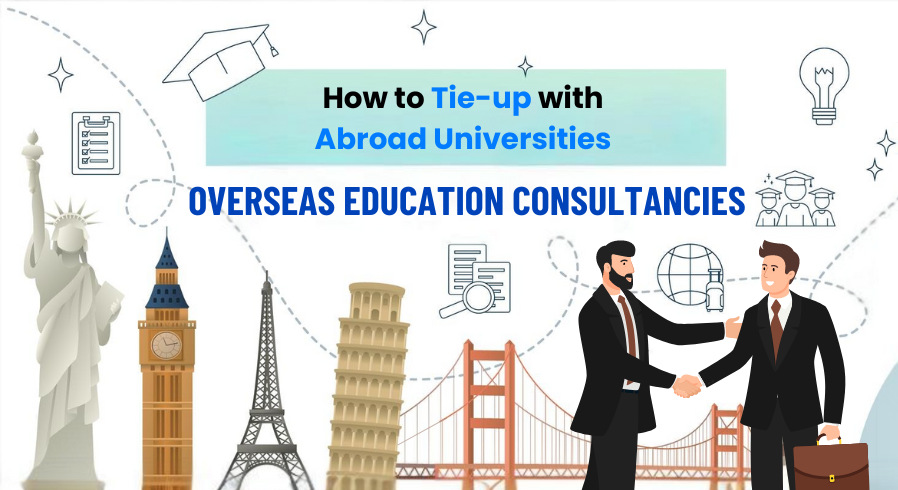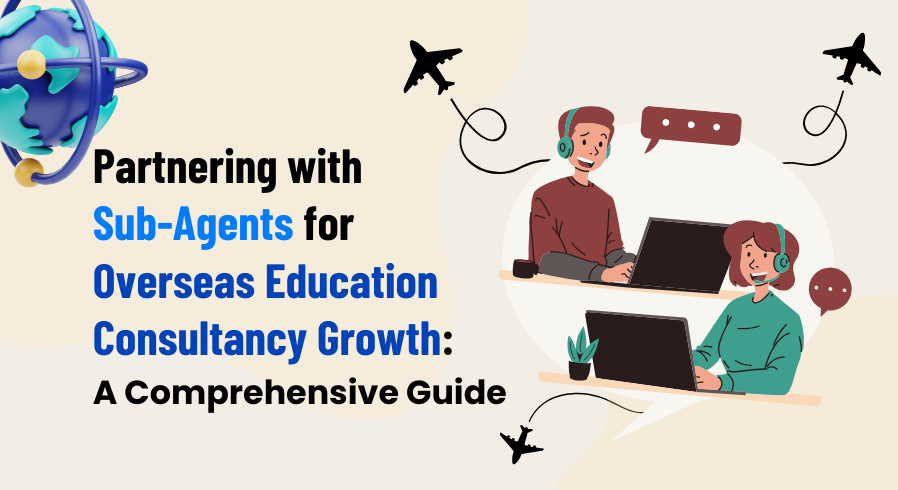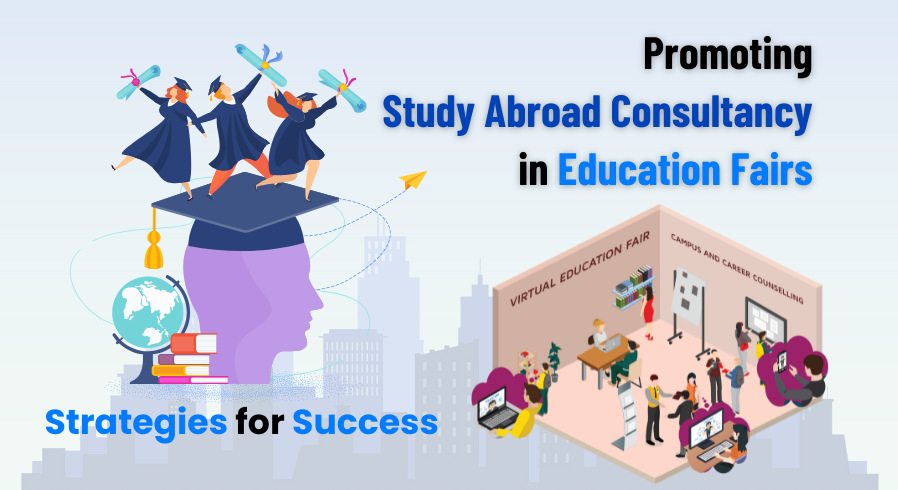Table of Contents

The study abroad market is growing daily so in the current generation more students are pursuing their studies across the world to acquire better job opportunities, diverse cultures, and experience. But just like in every other sector, it can be both satisfying and a bit difficult to increase the company’s market share and size. From this blog, the reader will be able to see practical measures that could be employed in the study abroad business to expand it and ensure that it is successful in the long run.
1. Understand Your Target Market

It is crucial to analyze the audience, which will define business growth. Everyone comes from a different family environment, and everyone has different reasons for studying abroad. Some will look for an improved education while others for an opportunity to study in another country or focus on certain areas of study. Invest ample time to know them, how they feel about the existing courses and their aspirations related to education
Demographic Segmentation
Undergraduate vs. Graduate Students: It may be understood that the needs of an undergraduate student are not the same as those of a graduate student. Meanwhile, the respondents who are undergraduates may be looking for a broader perspective related to life, whereas the respondents who are graduate students will be interested in concrete academic results.
- Countries of Origin: It is important to say that the priorities and regulations of each country’s education are unique. For example, students from developing countries may have an interest in visas and scholarships while students from developed countries may have an interest in the kind of experience they are going to get in their desired country.
Career Aspirations: Some students will perform their work based on technologically advanced countries such as the United States or Germany and the other will choose culturally related countries such as French or Italian respectively. Adapting to the above-mentioned conception promises to make your services more relevant.
2. Develop a Unique Value Proposition (UVP)

There is cutthroat competition in the study abroad market since several agents and companies are offering similar services. The Unique Value Proposition or the Unique Selling Point will help you differentiate yourself. This UVP should give concrete details as to why the consumers should choose your services over others. Consider aspects such as:
Exclusive Partnerships with Prestigious Universities: If you have affiliations with certain universities or institutions, then best highlight them
- End-to-End Support: The provision of extensive services right from application and up to visa and accommodation would be a unique selling point.
Career Counseling and Job Placements: Many students have concerns about what they are going to do after their studies. Adding career counselling or job placement services will attract more students.
3. Build Strong University Partnerships

Strong relationships with educational institutions abroad can make a significant difference to your business. Schools, colleges, and universities are always looking to attract international students. By building and maintaining solid partnerships with these institutions, you can offer exclusive opportunities to your clients.
Steps to Build Partnerships:
Attend International Education Conferences: Events like NAFSA or ICEF are great for networking with universities and educational institutions.
- Offer Value to Institutions: Be more than just an intermediary. Provide universities with insights into market trends, student needs, and regional dynamics. This can help you foster long-term relationships.
Regular Communication: Keep in touch with universities, not just during recruitment season but throughout the year. This will keep your business top of mind.
4. Enhance Your Digital Marketing Strategy

Marketing has proven to be very crucial in the growth of any business especially in the current era characterized by the use of technology. In the case of the study abroad sector, an organization’s online visibility is very crucial. Students resort mostly to the use of the Internet to make decisions on matters concerning their education. To reach this market, one is required to adopt the following strategies in digital marketing.
Search Engine Optimization (SEO):
Content Marketing: Writing articles, articles, and video content about study destinations, visas, scholarships, and other similar information.
- Local SEO: Local search will be helpful for you if you are targeting a specific area in which your business is situated. Choose and type keywords that students who are in your region will search using the search engines to find study abroad scholarships.
Backlinks from Educational Institutions: Approach schools for backlinking since they have web links to your website. This will enhance your DA and search rankings within the particular niche or the targeted domain.
Social Media Marketing:
Student Testimonials: Display the pictures and stories of the students you have assisted to study abroad as a way of encouraging other students.
- Interactive Content: Use polls, quizzes, and Q&A sessions on platforms like Instagram, YouTube, and TikTok to engage your audience.
Influencer Collaborations: Find other educators or learners who have studied in the countries you wish to cover to make content relatable to your audiences.
Paid Advertising:
Google Ads: You should consider running Google Ads as it gets students looking for study abroad programs.
Social Media Ads: Advertising options on the Internet such as Facebook and Instagram make it possible to address the potential students only.
5. Leverage Technology for Efficiency

Technology can help to improve your operations productivity and size of operations. In this case, it would be advisable to employ solutions that will help automate business operations and enhance customers’ satisfaction.
Customer Relationship Management (CRM) Software:
With the CRM system, you can track the leads, track the application process and even communicate with the students during their entire cycle. Sourcing these activities cuts down on paperwork and keeps you connected with prospects so you do not miss out on them.
AI Chatbots:
They can help in response to frequently asked questions, providing recommendations for programs, and booking consultations. It will therefore help you to be capable of delivering your support services round the clock without necessarily having to strain your employees.
Online Application Portals:
Establish an online portal where students can submit their documents, check the progress of their application and interact with the team. This eliminates the effort that students have to put in and also gives you the central repository to work on applications.
6. Offer Scholarships and Financial Aid Guidance

Of all the barriers that hinder students who intend to study in other countries, probably the most outstanding one is the cost. It helps to make services more attractive if one is willing to offer financial aid guidance or work with organisations to offer scholarships. When you do not directly award scholars, you will be a reference point for the students in terms of funding hence covering the ground.
Create a Scholarship Database:
List down the scholarships and grants available for your desired countries of study and the kind of financial assistance needed. Make sure to keep it fresh and post it on your website for all the visitors to read. This will increase traffic to your site and place your brand as the go-to site for students.
Partnership with Financial Institutions:
Partner with local banks/ financial institutions to provide special educational loans for students with special rates. To ensure that students with a limited budget are attracted to the partnership, ensure that these partnerships are marketed well.
7. Provide Exceptional Customer Service

For many students, the process of going to another country for studies is a small undertaking fraught with lots of risks. The level of customer service implies the company that, if done well, will help avoid competition and create a loyal customer base.
Personalized Consulting:
Extending individual appointments to the students plus their families demonstrates that you have an interest in each student’s achievement plan. This is a way of building confidence with customers and this may lead them to refer their friends to the business.
Timely Follow-ups:
Quite a several students fail to complete the application process due to follow-up or due to feeling overwhelmed. Ensure that your team engages the potential clients and officials to hear their concerns or issues that they come across.
After-Care Services:
Your job doesn’t necessarily end when a student gets onto that flight. Offer post-treatment care including easing their integration into a new country, finding them homes, and assisting with issues to do with acculturation. This will extend your reputation into the future through word of mouth and other recommendations through positive reviews.
8. Use Data Analytics to Make Informed Decisions

Big data and business intelligence are essential as the company grows as they will be used in monitoring performance, trends and students’ preferences for the products offered. This means that the analysis of the gathered data will assist the organization in fine-tuning its strategies to improve on the existing results.
Monitor Key Metrics:
An example include tracking lead conversion rate, client satisfaction ratings, as well as the ROI of a certain marketing strategy. This assists in finding out the strengths and the weaknesses that one has as well.
Adapt to Trends:
Stay updated on global trends in education and visa policies, and adapt your offerings accordingly. For example, if a country introduces favourable work visa policies for international students, highlight this in your marketing campaigns to attract more clients.
9. Diversify Your Offerings

While your core focus might be study abroad programs, consider diversifying your services to cater to other needs within the education space. Some options include:
Language Courses: Offer language preparation courses, particularly for students going to non-English speaking countries.
- Internships and Volunteer Programs: In addition to academic programs, many students look for internships or volunteer opportunities abroad. Partner with organizations to offer these as part of your portfolio.
Study Tours and Exchange Programs: Short-term programs like study tours can be a good entry point for students unsure about long-term study abroad commitments.
10. Leverage Word-of-Mouth and Referral Programs

Satisfied students are your best marketers. Word-of-mouth referrals can bring in high-quality leads at a low cost.
Create a Referral Program:
Offer incentives for students who refer friends or family to your services. This can be in the form of discounts, gift cards, or even cash rewards.
Collect and Showcase Testimonials:
Actively seek testimonials and case studies from students who have successfully gone through your program. Showcase these on your website, social media, and marketing materials to build credibility.
Conclusion
Growing a study abroad business requires a multi-faceted approach, including understanding your market, building strong partnerships, leveraging digital marketing, and offering exceptional customer service. By implementing these strategies, you can expand your reach, improve your service offerings, and ultimately grow your business sustainably. The key to success in this industry is staying adaptable, continuously learning, and always putting your students' needs first.









